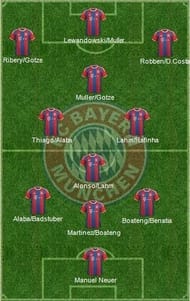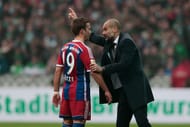The sale of Bastian Schweinsteiger has created unrest among the fans of FC Bayern Munchen. While a public admission by the home-grown club legend of wanting a new experience in the later stages of his career has quelled any major outrage, the focus of Die Roten is now squarely on their manager, Josep Guardiola.
Guardiola was hired by the executive board of Bayern Munich to bring a new ideology of football to the club - a philosophy which had previously won him titles and admirers alike at Barcelona. After two seasons of exhaustive experimentation, successive league titles and comprehensive Champions League semi-final defeats, is this the season when we will finally get to see a Bavarian team built in the image of Guardiola’s philosophy?
A New Core
The exit of ‘Schweini’, coupled with the arrival of Brazilian Douglas Costa, perhaps signals the beginning of the end for the old guard at Bayern Munich. The wingers, Arjen Robben and Franck Ribery, are on the wrong side of 30 and their injuries were one of the reasons Bayern’s season derailed in the final stages earlier this year. 31-year old Philipp Lahm will not be playing every minute of every match either, although his leadership qualities and intelligence on the pitch is highly-rated by Guardiola.
The first step in understanding Pep’s new-look Bayern would be to identify a new core of players around which a formidable outfit can be built. Manuel Neuer and Thomas Muller are no-brainers, both of them equally capable of taking over the mantle of captaincy from Lahm. David Alaba is another automatic choice- the left-back has played in several positions under the Catalan, and his skill coupled with his versatility makes him indispensable.
Thiago Alcantara was the player Guardiola wanted in his first transfer window and the latter’s continued faith in the Spanish midfielder means he has a significant role to play. Jerome Boateng has been the most improved player in Guardiola’s tenure and is set to become the lynchpin of the Bavarian defence.
Possible Formations
Keeping Guardiola’s possible new core in mind, Bayern Munich have the potential to assemble in a variety of formations. The possibilities are alarming for oppositions, but can be equally confusing for the manager himself, who has in fact drawn criticism from several quarters for over-experimentation.
The basic formation for Pep’s ‘juego de posicion’ remains a 4-3-3 consisting of a withdrawn centre-forward or a ‘false nine’. The unique nature of Bayern’s squad, however, presents problems in this playing style. Most prominent among them is the role of Muller. The German international, nicknamed the “Raumdeuter” for his ability to investigate space from wide positions, is not the archetypal winger who would rely on pace and agility to take on defenders.
Moreover, the potency of Robert Lewandowski as a false nine is questionable. The Polish striker is comfortable on the ball and possesses the ability to link-up with teammates but his real worth lies within the 18-yard box, where his finishing is as ruthless and as clinical as any other striker in the world. Withdrawing him from the box is, therefore, akin to depriving the team of goals.
The role of Muller in Guardiola’s playing style probably lies as an attacking midfielder who presses high up and, while attacking, intelligently drifts into spaces behind the striker while the wingers (Robben and Ribery) engage the defenders. For this space to be present in the first place, Lewandowski needs to play up top purely as a striker.
The versatility of Alaba and Lahm, on the other hand, offers extra option in midfield, as exemplified by Guardiola in the beginning of 2014/15. Alaba often joined the midfield and attacks from a left-sided centre-half position, functioning as a modern libero, while Lahm had the dual responsibility of maintaining possession and providing defensive cover for Robben on the wings.

The importance of Javi Martinez in major European games
The return to fitness of Javi Martinez enables Pep to tinker with the defence and solve the problem of vulnerability to counter-attacks, especially against strong attacking sides in the Champions League. Martinez can play in a double-pivot as well as an out-and-out defender. Moreover, he has the experience of playing in a 3-man defence (during his time at Athletic Bilbao), which implies that he has a significant role to play in Pep’ s possible tactical innovations with respect to defence.
The presence of Martinez in a 3-man defence provides additional cover to the ageing legs of Xabi Alonso in central areas (a role Schweinsteiger was not suited to). If the situation of the game demands, he can also move further up field to partner Alonso or even replace him to perform a role similar to Sergio Busquets at Barcelona and support the attacking midfielders.
3-4-3 diamond- The Ultimate formation to maximize attacking strengths?
A combination of all the above-mentioned tactics is possible through a 3-4-3 diamond formation, last implemented successfully in Europe by Louis van Gaal’s Ajax in the 90s. This formation would allow Muller and Lewandowski to flourish, provide width upfront, achieve superiority in numbers in both midfield and attack and still have three defenders centrally to deal with counter-attacks.
A 3-4-3 diamond is highly demanding physically as well as mentally, leaves no room for error for any player on the pitch and is nearly impossible to successfully implement throughout the season. It would, however be an effective plan against teams defending deep within their own half and would certainly come in handy in losing positions.
Playing Bayern Munich in this formation might be the gateway to the footballing utopia Guardiola so often craves for. Needless to say, if nothing else seems to work in a Champions League this time, this would be his final throw of the dice.
Difficult Decisions
The lack of confidence shown by Guardiola in Gotze is baffling. The German World Cup star ticks every box when it comes to the kind of forwards the ex-Barcelona manager prefers- fleet of foot, supreme ball-control, possessing an eye for a pass and clinical finishing inside the box. Notwithstanding his abilities, Gotze’s contribution to Guardiola’s Bayern has been peripheral at best, at times even when both Robben and Ribery were out injured.
It is here that Guardiola will have to make some hard choices, much like he made with Schweinsteiger. Losing a player of Gotze’s calibre may be detrimental, but so is keeping him on the sidelines. Similarly, Dante, one of the standout performers of the treble-winning 2012/13 season, looks more uncomfortable in Guardiola’s set-up with every passing day.
The presence of such players cutting a forlorn, dissatisfied figure breeds doubt in the manager’s methods within the squad and this is where the real test of Guardiola’s philosophy at Bayern Munich lies. His vision of football was relatively simple to implement at Barcelona, where tiki-taka and possession football was a way of life starting from the youth level itself, where no player needed to be told that to keep possession was the ideal way to play football.
Things are different in Germany, and the onus is on Pep to provide them with a fresh perspective. For this, he will need the complete, unshakeable belief of his players in his methods. If a player like Gotze does not fit in his scheme, it would be far more prudent to let him go and instead show more faith in youngsters like Hojberg, Weiser, Gaudino and Rode. Doing this will not only endear him to fans, but will also help in achieving the long-term purpose of his appointment by Bayern Munich- to bring the beautiful game to the grassroots level of Germany.
Only then will we be able to see the Bavarians of Josep Guardiola. Two years on, it is about time we did.



